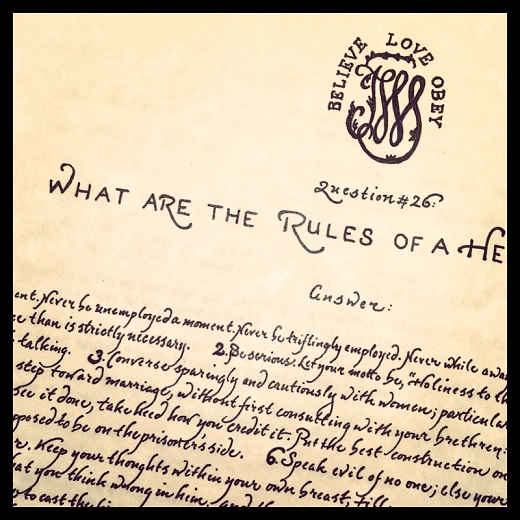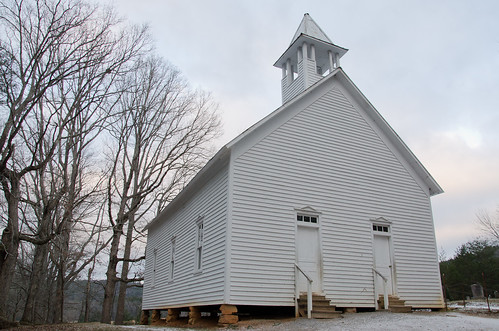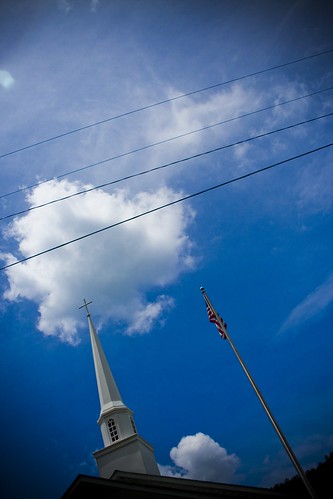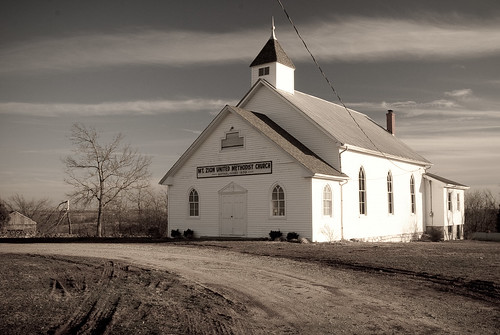Long ago when Methodism was still a movement, John Wesley gave his “helpers” a list of 12 rules to follow.
These “helpers” were lay preachers who were just starting to travel around and preach in various places.
I’m sure they were like many people just starting in ministry—hungry for guidance from those who had gone ahead of them, hoping not to make egregious mistakes with people’s souls, and excited about the mission that they were embarking upon.
Since my friends and I fit this same description two years ago when we were all graduating from seminary and being sent off to places around the country to preach, I decided to give them a list of Wesley’s 12 rules to hang in their offices. Of course, I made a copy for myself and it currently hangs on the “Wesley Wall” of my office.
I read over the rules regularly for basic guidance and to remind myself of the serious work to which I’ve been called. While I don’t take all of them literally (see rule number two:confession–sometimes I joke around), I’ve found them extremely helpful these last two years.
May they guide you today:
Q. 26. What are the rules of a Helper?
1. Be diligent. Never be unemployed a moment. Never be triflingly employed. Never while away time; neither spend any more time at any place than is strictly necessary.
2. Be serious. Let your motto be, “Holiness to the Lord.” Avoid all lightness, jesting, and foolish talking.
3. Converse sparingly and cautiously with women; particularly, with young women.
4. Take no step toward marriage, without first consulting with your brethren.
5. Believe evil of no one; unless you see it done, take heed how you credit it. Put the best construction on every- thing. You know the Judge is always supposed to be on the prisoner’s side.
6. Speak evil of no one; else your word especially would eat as doth a canker. Keep your thoughts within your own breast, till you come to the person concerned.
7. Tell every one what you think wrong in him, and that plainly, as soon as may be; else it will fester in your heart. Make all haste to cast the fire out of your bosom.
8. Do not affect the gentleman. You have no more to do with this character than with that of a dancing-master. A Preacher of the gospel is the servant of all.
9. Be ashamed of nothing but sin: Not of fetching wood (if time permit) or drawing water; not of cleaning your own shoes, or your neighbour’s.
10. Be punctual. Do everything exactly at the time. And in general, do not mend our Rules, but keep them; not for wrath, but for conscience’ sake.
11. You have nothing to do but to save souls. Therefore spend and be spent in this work. And go always, not only to those that want you, but to those that want you most.
Observe: It is not your business to preach so many times, and to take care of this or that society; but to save as many souls as you can; to bring as many sinners as you possibly can to repentance, and with all your power to build them up in that holiness without which they cannot see the Lord. And remember! A Methodist Preacher is to mind every point, great and small, in the Methodist discipline! Therefore you will need all the sense you have, and to have all your wits about you!
12. Act in all things, not according to your own will, but as a son in the Gospel. As such, it is your part to employ your time in the manner which we direct; partly, in preaching and visiting from house to house; partly, in reading, meditation, and prayer. Above all, if you labour with us in our Lord’s vineyard, it is needful that you should do that part of the work which we advise, at those times and places which we judge most for his glory.
The copy I gave to my friends was one that I commissioned. My friend Nate Rauh did an amazing job writing the rules out in script and adding John Wesley’s seal to them. I’d like to share this work of art with you in case you’d like to print a copy for yourself.
You can download this beautiful PDF copy of John Wesley’s rules here.




